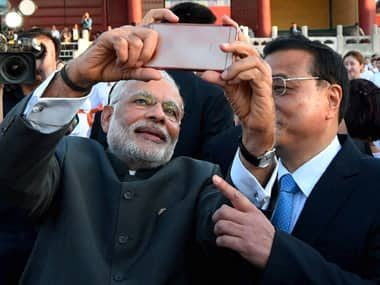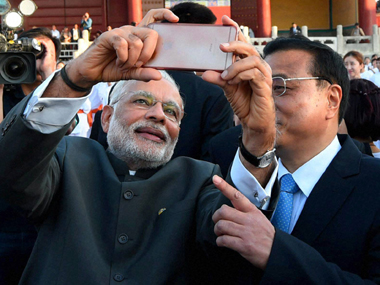Prime Minister Narendra Modi’s economic pitch in China conveys the clear message that an economic engagement will be a better confidence building measure than a political one. In a bid to give a big push to economic partnership, India and China on Friday signed 24 agreements worth $10 billion. This may bring cheer to the corporate world and to those sectors in which agreements have been signed, but what about the apprehensions that Chinese investors have about India? Will India address those grievances that Chinese investors have raised while making investments in India? [caption id=“attachment_2246878” align=“alignleft” width=“380”]
 PM Modi and Premier Li in a power packed selfie. PTI[/caption] India’s total trade in 2013-14 stands at $764.13bn, while with China it’s only $65.85bn. Between April 2000 and February 2015, the cumulative global FDI Equity inflow to India was $364.78bn, while FDI inflow from China during the same period stands at $887.80mn – which is only 0.36% share in the total FDI. “China’s FDI inflow to India is miniscule in comparison to the global figure. India’s trade deficit with China is $36.21bn. This shows that India has to be proactive in addressing the concerns of the Chinese investors. The Chinese investors in particular don’t like to wait for years; they want fast operations. If it’s not happening in India, they will put money elsewhere,” associate fellow at Institute of Chinese Studies, Aravind Yelery told Firstpost. “We talk about contentious issues, trust deficit, etc. But economic relationship can’t be built on trust alone. It’s the other way round. Mutual trust follows the economic relationship built between the nations, which is stronger than a political relationship. Therefore, PM Narendra Modi is focusing more on economic issues for trust building. For Chinese entrepreneurs to respond, India has to provide a better investment and market-friendly environment,” he said. According to the industry sources, there were many Chinese industries, which had backed out due to inordinate delay in getting clearances. LiuGong India Private Limited, a subsidiary of Guangxi Liu Gong Machinery Company (China) – a heavy earthmoving and construction equipment company, is a case in point. The company could finally set up its manufacturing facility at Pithampur (Madhya Pradesh) in 2009. “It took the company more than seven years to get its feasibility study done and get clearances. Similarly, there are other Chinese companies who too have faced delays. This distracts other investors from venturing in India,” pointed out Yelery. China’s worries: · India’s regulatory mechanism. · India has been perceived as non investor-friendly. · Multiple clearances are required and take a lot of time. · Infrastructure bottlenecks. · Major gap between promises made and on-ground execution. · Indians can buy assets in China, but Chinese can’t do the same in India. · Policy paralysis. “Economy is the most important area, where India-China can forge a partnership, because China has a lot of money to invest. The PM has given top priority to economic agenda and if he can fast track the investment process, India’s relation with China is likely to be better and stronger. Other issues can be taken care of on the basis of this economic partnership and trust,” said Prof Alka Acharya, director, Institute of Chinese Studies, a think-tank. “If India addresses these concerns, Modi’s ‘Make in India’ programme will get a leg-up,” she added. But, experts believe that China too has to respond to India’s concern in trade and investment. India’s expectations: · China should provide market access to India. · No discriminative trade remedies. China needs to be rationale. · Transparency and an equitable tax regime. · Support from Chinese provinces. As a first step, during bilateral talks on Friday, India and China have decided to set up a special task force to deal with trade deficit and signed agreements on establishing a provincial partnership between Karnataka and Sichuan and sister-city relationships between Aurangabad - Dunhuang, Chennai - Chongqing and Hyderabad – Qingdao. Added Yelery, a political economist and a specialist in India-China relations, “Support from Chinese provinces is very important, because provincial entrepreneurs function independent of the Chinese president. The agreement signed in this direction is a welcome measure. Simultaneously, China too should end trade discrimination. Trade volume grows geometrically, whereas investment proceeds mathematically. India must force China to open its market for Indian goods. China imports rice from Pakistan, but not from India by imposing restriction, which is a grave injustice.” Experts believe that India can have a considerable influence on Chinese market with its products related to the following sectors: pharmaceutical, rice, IT, infrastructure, agro-products, banking, etc.
PM Modi and Premier Li in a power packed selfie. PTI[/caption] India’s total trade in 2013-14 stands at $764.13bn, while with China it’s only $65.85bn. Between April 2000 and February 2015, the cumulative global FDI Equity inflow to India was $364.78bn, while FDI inflow from China during the same period stands at $887.80mn – which is only 0.36% share in the total FDI. “China’s FDI inflow to India is miniscule in comparison to the global figure. India’s trade deficit with China is $36.21bn. This shows that India has to be proactive in addressing the concerns of the Chinese investors. The Chinese investors in particular don’t like to wait for years; they want fast operations. If it’s not happening in India, they will put money elsewhere,” associate fellow at Institute of Chinese Studies, Aravind Yelery told Firstpost. “We talk about contentious issues, trust deficit, etc. But economic relationship can’t be built on trust alone. It’s the other way round. Mutual trust follows the economic relationship built between the nations, which is stronger than a political relationship. Therefore, PM Narendra Modi is focusing more on economic issues for trust building. For Chinese entrepreneurs to respond, India has to provide a better investment and market-friendly environment,” he said. According to the industry sources, there were many Chinese industries, which had backed out due to inordinate delay in getting clearances. LiuGong India Private Limited, a subsidiary of Guangxi Liu Gong Machinery Company (China) – a heavy earthmoving and construction equipment company, is a case in point. The company could finally set up its manufacturing facility at Pithampur (Madhya Pradesh) in 2009. “It took the company more than seven years to get its feasibility study done and get clearances. Similarly, there are other Chinese companies who too have faced delays. This distracts other investors from venturing in India,” pointed out Yelery. China’s worries: · India’s regulatory mechanism. · India has been perceived as non investor-friendly. · Multiple clearances are required and take a lot of time. · Infrastructure bottlenecks. · Major gap between promises made and on-ground execution. · Indians can buy assets in China, but Chinese can’t do the same in India. · Policy paralysis. “Economy is the most important area, where India-China can forge a partnership, because China has a lot of money to invest. The PM has given top priority to economic agenda and if he can fast track the investment process, India’s relation with China is likely to be better and stronger. Other issues can be taken care of on the basis of this economic partnership and trust,” said Prof Alka Acharya, director, Institute of Chinese Studies, a think-tank. “If India addresses these concerns, Modi’s ‘Make in India’ programme will get a leg-up,” she added. But, experts believe that China too has to respond to India’s concern in trade and investment. India’s expectations: · China should provide market access to India. · No discriminative trade remedies. China needs to be rationale. · Transparency and an equitable tax regime. · Support from Chinese provinces. As a first step, during bilateral talks on Friday, India and China have decided to set up a special task force to deal with trade deficit and signed agreements on establishing a provincial partnership between Karnataka and Sichuan and sister-city relationships between Aurangabad - Dunhuang, Chennai - Chongqing and Hyderabad – Qingdao. Added Yelery, a political economist and a specialist in India-China relations, “Support from Chinese provinces is very important, because provincial entrepreneurs function independent of the Chinese president. The agreement signed in this direction is a welcome measure. Simultaneously, China too should end trade discrimination. Trade volume grows geometrically, whereas investment proceeds mathematically. India must force China to open its market for Indian goods. China imports rice from Pakistan, but not from India by imposing restriction, which is a grave injustice.” Experts believe that India can have a considerable influence on Chinese market with its products related to the following sectors: pharmaceutical, rice, IT, infrastructure, agro-products, banking, etc.
PM Modi’s pitch in China: Why trade deals are more important than political ones
Debobrat Ghose
• May 16, 2015, 13:47:13 IST
PM Narendra Modi is focusing more on economic issues for trust building
Advertisement
)
End of Article